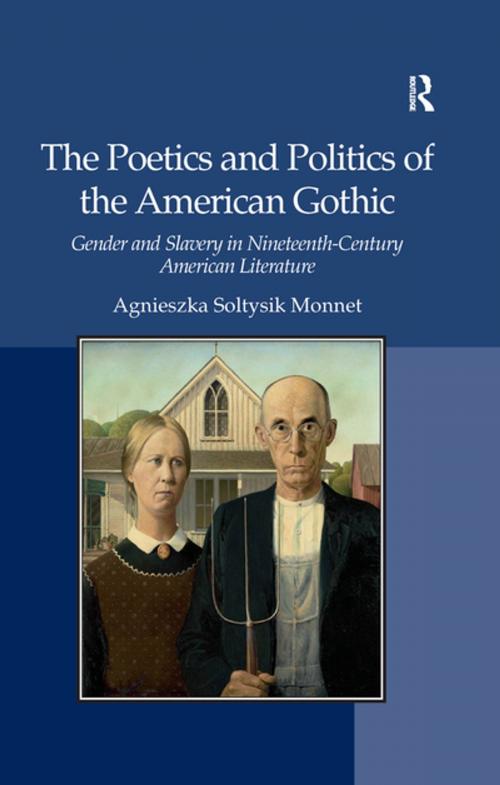The Poetics and Politics of the American Gothic
Gender and Slavery in Nineteenth-Century American Literature
Fiction & Literature, Literary Theory & Criticism| Author: | Agnieszka Soltysik Monnet | ISBN: | 9781351884143 |
| Publisher: | Taylor and Francis | Publication: | December 5, 2016 |
| Imprint: | Routledge | Language: | English |
| Author: | Agnieszka Soltysik Monnet |
| ISBN: | 9781351884143 |
| Publisher: | Taylor and Francis |
| Publication: | December 5, 2016 |
| Imprint: | Routledge |
| Language: | English |
Taking as its point of departure recent insights about the performative nature of genre, The Poetics and Politics of the American Gothic challenges the critical tendency to accept at face value that gothic literature is mainly about fear. Instead, Agnieszka Soltysik Monnet argues that the American Gothic, and gothic literature in general, is also about judgment: how to judge and what happens when judgment is confronted with situations that defy its limits. Poe, Hawthorne, Melville, Gilman, and James all shared a concern with the political and ideological debates of their time, but tended to approach these debates indirectly. Thus, Monnet suggests, while slavery and race are not the explicit subject matter of antebellum works by Poe and Hawthorne, they nevertheless permeate it through suggestive analogies and tacit references. Similarly, Melville, Gilman, and James use the gothic to explore the categories of gender and sexuality that were being renegotiated during the latter half of the century. Focusing on "The Fall of the House of Usher," The Marble Faun, Pierre, The Turn of the Screw, and "The Yellow Wallpaper," Monnet brings to bear minor texts by the same authors that further enrich her innovative readings of these canonical works. At the same time, her study persuasively argues that the Gothic's endurance and ubiquity are in large part related to its being uniquely adapted to rehearse questions about judgment and justice that continue to fascinate and disturb.
Taking as its point of departure recent insights about the performative nature of genre, The Poetics and Politics of the American Gothic challenges the critical tendency to accept at face value that gothic literature is mainly about fear. Instead, Agnieszka Soltysik Monnet argues that the American Gothic, and gothic literature in general, is also about judgment: how to judge and what happens when judgment is confronted with situations that defy its limits. Poe, Hawthorne, Melville, Gilman, and James all shared a concern with the political and ideological debates of their time, but tended to approach these debates indirectly. Thus, Monnet suggests, while slavery and race are not the explicit subject matter of antebellum works by Poe and Hawthorne, they nevertheless permeate it through suggestive analogies and tacit references. Similarly, Melville, Gilman, and James use the gothic to explore the categories of gender and sexuality that were being renegotiated during the latter half of the century. Focusing on "The Fall of the House of Usher," The Marble Faun, Pierre, The Turn of the Screw, and "The Yellow Wallpaper," Monnet brings to bear minor texts by the same authors that further enrich her innovative readings of these canonical works. At the same time, her study persuasively argues that the Gothic's endurance and ubiquity are in large part related to its being uniquely adapted to rehearse questions about judgment and justice that continue to fascinate and disturb.















